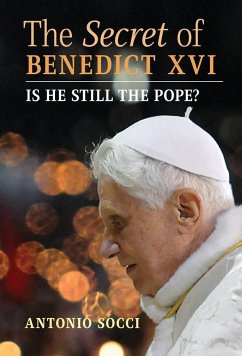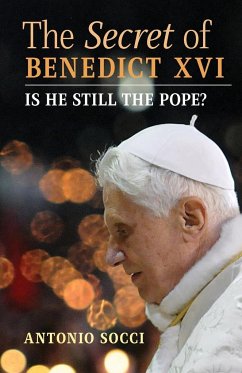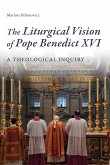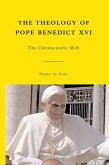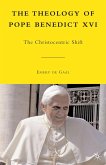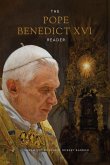- Gebundenes Buch
- Merkliste
- Auf die Merkliste
- Bewerten Bewerten
- Teilen
- Produkt teilen
- Produkterinnerung
- Produkterinnerung
This is an upper-level introduction to the thought and theology of Pope Benedict XVI. The book explains the foundations of Ratzinger's thought by analysing the theological axes upon which his works turn and helps readers to place his thought in the context of his intellectual antecedents and contemporary interlocutors.
Andere Kunden interessierten sich auch für
![The Secret of Benedict XVI The Secret of Benedict XVI]() Antonio SocciThe Secret of Benedict XVI26,99 €
Antonio SocciThe Secret of Benedict XVI26,99 €![The Secret of Benedict XVI The Secret of Benedict XVI]() Antonio SocciThe Secret of Benedict XVI20,99 €
Antonio SocciThe Secret of Benedict XVI20,99 €![The Thought of Pope Benedict XVI new edition The Thought of Pope Benedict XVI new edition]() Aidan Nichols OpThe Thought of Pope Benedict XVI new edition42,99 €
Aidan Nichols OpThe Thought of Pope Benedict XVI new edition42,99 €![The Liturgical Vision of Pope Benedict XVI The Liturgical Vision of Pope Benedict XVI]() Mariusz BiliniewiczThe Liturgical Vision of Pope Benedict XVI80,30 €
Mariusz BiliniewiczThe Liturgical Vision of Pope Benedict XVI80,30 €![The Theology of Pope Benedict XVI The Theology of Pope Benedict XVI]() Kenneth A. LoparoThe Theology of Pope Benedict XVI42,99 €
Kenneth A. LoparoThe Theology of Pope Benedict XVI42,99 €![The Theology of Pope Benedict XVI The Theology of Pope Benedict XVI]() Kenneth A. LoparoThe Theology of Pope Benedict XVI38,99 €
Kenneth A. LoparoThe Theology of Pope Benedict XVI38,99 €![The Pope Benedict XVI Reader The Pope Benedict XVI Reader]() Pope Benedict XviThe Pope Benedict XVI Reader22,99 €
Pope Benedict XviThe Pope Benedict XVI Reader22,99 €-
-
-
This is an upper-level introduction to the thought and theology of Pope Benedict XVI. The book explains the foundations of Ratzinger's thought by analysing the theological axes upon which his works turn and helps readers to place his thought in the context of his intellectual antecedents and contemporary interlocutors.
Produktdetails
- Produktdetails
- Verlag: Continuum
- Seitenzahl: 214
- Erscheinungstermin: 13. Mai 2010
- Englisch
- Abmessung: 222mm x 145mm x 15mm
- Gewicht: 407g
- ISBN-13: 9780567034366
- ISBN-10: 0567034364
- Artikelnr.: 28356889
- Herstellerkennzeichnung
- Libri GmbH
- Europaallee 1
- 36244 Bad Hersfeld
- gpsr@libri.de
- Verlag: Continuum
- Seitenzahl: 214
- Erscheinungstermin: 13. Mai 2010
- Englisch
- Abmessung: 222mm x 145mm x 15mm
- Gewicht: 407g
- ISBN-13: 9780567034366
- ISBN-10: 0567034364
- Artikelnr.: 28356889
- Herstellerkennzeichnung
- Libri GmbH
- Europaallee 1
- 36244 Bad Hersfeld
- gpsr@libri.de
Tracey Rowland holds the St John Paul II Chair of Theology at the University of Notre Dame, Australia and is a member of the International Theological Commission.
Chapter I: The Intellectual Antecedents and Contemporary Interlocutors:
Including the seminal contributions to Ratzinger's thought of: Sts.
Augustine and Bonaventure, John Henry Newman, Romano Guardini, Peter Wust,
Josef Pieper, Martin Buber, Theodore Häcker, Gottlieb Söhngen, Luigi
Giussani, Hans Urs von Balthasar and Henri de Lubac SJ; and the works of
interlocutors, Josef Rupert Geiselman, Walter Kasper, Hans Küng, and Paul
Knitter. Karl Rahner fits in as both an early antecedent and an
interlocutor.
Chapter II: The Response to the Modernist Crisis
This will include a guide through Ratzinger's many works relating to
principles of scriptural interpretation, including documents of the
Pontifical Biblical Commission produced under his chairmanship,; and also
to his critique of the Suarezian account of Revelation which reached its
zenith in the 1960s in the Dei Verbum document of the Second Vatican
Council, which Ratzinger and Karl Rahner helped to draft, and the work on
Revelation and Tradition co-authored by Ratzinger and Rahner.
Chapter III: The Response to Heidegger
This will include material from Ratzinger's Principles of Catholic Theology
where he states that an understanding of the mediation of history in the
realm of ontology is 'the fundamental crisis of our age'. It will also
provide an exposition of Ratzinger's criticisms of Karl Rahner's approach
to the crisis and his preference for the approach of von Balthasar.
Chapter IV: The Essential Difference of Christianity
This will cover themes in Ratzinger's seminal Introduction to Christianity
(which was anything but an introduction) and more contemporary essays by
Ratzinger, including his year 2000 Sorbonne Address, where he presents his
understanding of what Christianity is within the context of other world
religions. The controversial Regensburg Address will be covered here.
Chapter V: The Response to Kasper and Küng
This will cover the criticisms of Ratzinger's ecclesiology from Walter
Kasper and Hans Küng and his responses to them. The seminal importance of
Augustine and de Lubac for Ratzinger's ecclesiology will be covered here.
Chapter VI: The Theological Virtues
Since Ratzinger became Benedict XVI he has released two encyclicals: one on
love (Deus Caritas Est 2007) and one on hope (Spe Salvi 2008). Since faith,
hope and love are treated in theology as the three theological virtues, it
is anticipated that a third encyclical will appear in the first half of
2009 on faith. This chapter will provide an overview of the major ideas in
the three encyclicals and references to the most important commentaries
thereon.
Chapter VII: The Importance of Beauty & other Augustinian Motifs
This will include an account of the significance of the transcendental of
beauty in Ratzinger's theology and his various criticisms of contemporary
mass culture, including the rock music industry. This will be placed in the
context of his Augustinian personalism.
Including the seminal contributions to Ratzinger's thought of: Sts.
Augustine and Bonaventure, John Henry Newman, Romano Guardini, Peter Wust,
Josef Pieper, Martin Buber, Theodore Häcker, Gottlieb Söhngen, Luigi
Giussani, Hans Urs von Balthasar and Henri de Lubac SJ; and the works of
interlocutors, Josef Rupert Geiselman, Walter Kasper, Hans Küng, and Paul
Knitter. Karl Rahner fits in as both an early antecedent and an
interlocutor.
Chapter II: The Response to the Modernist Crisis
This will include a guide through Ratzinger's many works relating to
principles of scriptural interpretation, including documents of the
Pontifical Biblical Commission produced under his chairmanship,; and also
to his critique of the Suarezian account of Revelation which reached its
zenith in the 1960s in the Dei Verbum document of the Second Vatican
Council, which Ratzinger and Karl Rahner helped to draft, and the work on
Revelation and Tradition co-authored by Ratzinger and Rahner.
Chapter III: The Response to Heidegger
This will include material from Ratzinger's Principles of Catholic Theology
where he states that an understanding of the mediation of history in the
realm of ontology is 'the fundamental crisis of our age'. It will also
provide an exposition of Ratzinger's criticisms of Karl Rahner's approach
to the crisis and his preference for the approach of von Balthasar.
Chapter IV: The Essential Difference of Christianity
This will cover themes in Ratzinger's seminal Introduction to Christianity
(which was anything but an introduction) and more contemporary essays by
Ratzinger, including his year 2000 Sorbonne Address, where he presents his
understanding of what Christianity is within the context of other world
religions. The controversial Regensburg Address will be covered here.
Chapter V: The Response to Kasper and Küng
This will cover the criticisms of Ratzinger's ecclesiology from Walter
Kasper and Hans Küng and his responses to them. The seminal importance of
Augustine and de Lubac for Ratzinger's ecclesiology will be covered here.
Chapter VI: The Theological Virtues
Since Ratzinger became Benedict XVI he has released two encyclicals: one on
love (Deus Caritas Est 2007) and one on hope (Spe Salvi 2008). Since faith,
hope and love are treated in theology as the three theological virtues, it
is anticipated that a third encyclical will appear in the first half of
2009 on faith. This chapter will provide an overview of the major ideas in
the three encyclicals and references to the most important commentaries
thereon.
Chapter VII: The Importance of Beauty & other Augustinian Motifs
This will include an account of the significance of the transcendental of
beauty in Ratzinger's theology and his various criticisms of contemporary
mass culture, including the rock music industry. This will be placed in the
context of his Augustinian personalism.
Chapter I: The Intellectual Antecedents and Contemporary Interlocutors:
Including the seminal contributions to Ratzinger's thought of: Sts.
Augustine and Bonaventure, John Henry Newman, Romano Guardini, Peter Wust,
Josef Pieper, Martin Buber, Theodore Häcker, Gottlieb Söhngen, Luigi
Giussani, Hans Urs von Balthasar and Henri de Lubac SJ; and the works of
interlocutors, Josef Rupert Geiselman, Walter Kasper, Hans Küng, and Paul
Knitter. Karl Rahner fits in as both an early antecedent and an
interlocutor.
Chapter II: The Response to the Modernist Crisis
This will include a guide through Ratzinger's many works relating to
principles of scriptural interpretation, including documents of the
Pontifical Biblical Commission produced under his chairmanship,; and also
to his critique of the Suarezian account of Revelation which reached its
zenith in the 1960s in the Dei Verbum document of the Second Vatican
Council, which Ratzinger and Karl Rahner helped to draft, and the work on
Revelation and Tradition co-authored by Ratzinger and Rahner.
Chapter III: The Response to Heidegger
This will include material from Ratzinger's Principles of Catholic Theology
where he states that an understanding of the mediation of history in the
realm of ontology is 'the fundamental crisis of our age'. It will also
provide an exposition of Ratzinger's criticisms of Karl Rahner's approach
to the crisis and his preference for the approach of von Balthasar.
Chapter IV: The Essential Difference of Christianity
This will cover themes in Ratzinger's seminal Introduction to Christianity
(which was anything but an introduction) and more contemporary essays by
Ratzinger, including his year 2000 Sorbonne Address, where he presents his
understanding of what Christianity is within the context of other world
religions. The controversial Regensburg Address will be covered here.
Chapter V: The Response to Kasper and Küng
This will cover the criticisms of Ratzinger's ecclesiology from Walter
Kasper and Hans Küng and his responses to them. The seminal importance of
Augustine and de Lubac for Ratzinger's ecclesiology will be covered here.
Chapter VI: The Theological Virtues
Since Ratzinger became Benedict XVI he has released two encyclicals: one on
love (Deus Caritas Est 2007) and one on hope (Spe Salvi 2008). Since faith,
hope and love are treated in theology as the three theological virtues, it
is anticipated that a third encyclical will appear in the first half of
2009 on faith. This chapter will provide an overview of the major ideas in
the three encyclicals and references to the most important commentaries
thereon.
Chapter VII: The Importance of Beauty & other Augustinian Motifs
This will include an account of the significance of the transcendental of
beauty in Ratzinger's theology and his various criticisms of contemporary
mass culture, including the rock music industry. This will be placed in the
context of his Augustinian personalism.
Including the seminal contributions to Ratzinger's thought of: Sts.
Augustine and Bonaventure, John Henry Newman, Romano Guardini, Peter Wust,
Josef Pieper, Martin Buber, Theodore Häcker, Gottlieb Söhngen, Luigi
Giussani, Hans Urs von Balthasar and Henri de Lubac SJ; and the works of
interlocutors, Josef Rupert Geiselman, Walter Kasper, Hans Küng, and Paul
Knitter. Karl Rahner fits in as both an early antecedent and an
interlocutor.
Chapter II: The Response to the Modernist Crisis
This will include a guide through Ratzinger's many works relating to
principles of scriptural interpretation, including documents of the
Pontifical Biblical Commission produced under his chairmanship,; and also
to his critique of the Suarezian account of Revelation which reached its
zenith in the 1960s in the Dei Verbum document of the Second Vatican
Council, which Ratzinger and Karl Rahner helped to draft, and the work on
Revelation and Tradition co-authored by Ratzinger and Rahner.
Chapter III: The Response to Heidegger
This will include material from Ratzinger's Principles of Catholic Theology
where he states that an understanding of the mediation of history in the
realm of ontology is 'the fundamental crisis of our age'. It will also
provide an exposition of Ratzinger's criticisms of Karl Rahner's approach
to the crisis and his preference for the approach of von Balthasar.
Chapter IV: The Essential Difference of Christianity
This will cover themes in Ratzinger's seminal Introduction to Christianity
(which was anything but an introduction) and more contemporary essays by
Ratzinger, including his year 2000 Sorbonne Address, where he presents his
understanding of what Christianity is within the context of other world
religions. The controversial Regensburg Address will be covered here.
Chapter V: The Response to Kasper and Küng
This will cover the criticisms of Ratzinger's ecclesiology from Walter
Kasper and Hans Küng and his responses to them. The seminal importance of
Augustine and de Lubac for Ratzinger's ecclesiology will be covered here.
Chapter VI: The Theological Virtues
Since Ratzinger became Benedict XVI he has released two encyclicals: one on
love (Deus Caritas Est 2007) and one on hope (Spe Salvi 2008). Since faith,
hope and love are treated in theology as the three theological virtues, it
is anticipated that a third encyclical will appear in the first half of
2009 on faith. This chapter will provide an overview of the major ideas in
the three encyclicals and references to the most important commentaries
thereon.
Chapter VII: The Importance of Beauty & other Augustinian Motifs
This will include an account of the significance of the transcendental of
beauty in Ratzinger's theology and his various criticisms of contemporary
mass culture, including the rock music industry. This will be placed in the
context of his Augustinian personalism.


